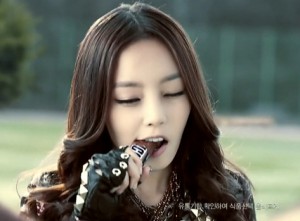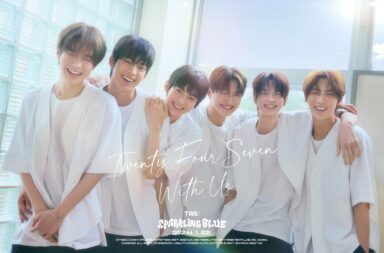 Ever since their “Alone” promotions and the recent success of “Loving U,” Sistar has been on the screen not only for music shows, but as endorsers for a variety of products. Their new status is set to guarantee them a place in everyone’s heart for the time being. While this is just a side-effect of idoldom, it provides another medium through which artists can stay relevant. Ko So-young was the image of different companies despite not appearing for about five years in a movie or drama and she was currently cast in To the Beautiful You. Granted, she’s a legend by now and her marriage to Jang Dong-gun kept that spark of interest, but she needed to offer the public a constant reminder, in the form of endorsements.
Ever since their “Alone” promotions and the recent success of “Loving U,” Sistar has been on the screen not only for music shows, but as endorsers for a variety of products. Their new status is set to guarantee them a place in everyone’s heart for the time being. While this is just a side-effect of idoldom, it provides another medium through which artists can stay relevant. Ko So-young was the image of different companies despite not appearing for about five years in a movie or drama and she was currently cast in To the Beautiful You. Granted, she’s a legend by now and her marriage to Jang Dong-gun kept that spark of interest, but she needed to offer the public a constant reminder, in the form of endorsements.
The connection between public figures and advertising is definitely not a Korean thing. What is particular in its case though is how strong the association is there. The commercials featuring celebrities reach different percentages (out of the total of commercials), depending on the region: about 15% for Western countries, 25% for Brazil, Hong Kong, Malaysia and China and an astonishing 65% for South Korea. Even if we stayed out of comparisons, having more than 1 out of 2 products idol-promoted is an insanely high rate.
The answer to why the need for a star-struck advertising industry exists is simple at a first glance. The viewers establish a connection with their favorite idols. When they appear on a show, you watch your bias, often separating her/him from the rest: you know what’s yours and what’s not. This simple association of one’s individual choices with a public person’s actions makes the fans more prone to pay attention when the object/subject of their affection shows up. Besides, most commercials use celebrities as role-models: they are successful, beautiful and desirable. By linking their products with their achievements, ads insinuate the average citizen can take a shortcut and look just as good by simply using their merchandise.
But these reasons are general and fail to explain regional differences. So why such a huge rate in South Korea?
Without doubt, the Korean entertainment industry plays a huge role in the South Korean socio-economical equation, which influences the way enterprises prefer to sell their products. The ubiquitous K-pop idols have gathered around themselves a mass of dedicated fans who support them to worrying extents sometimes. These entertainers and their companies have shaped throughout the years the music scene we love today, which welcomes devout and trustworthy individuals as main buyers. Taking into account the audience we’re talking about is also the main target of many of the marketers, it makes more sense to pay an idol for a promotion.
On the other side, the problem with money distribution comes up. How many times haven’t we heard about companies giving a hand to improve sales of their artists so they can seclude a higher position? Even Sistar had to pass through one with their “Loving U” promotions. Corruption, company-stimulated sales, uneven distribution of profit and the preference for downloading against buying raises some serious questions about how much money these artists are actually earning. Activities outside their main occupation bring in profits they would otherwise work much harder to earn. It gets to be a win-win situation: the idols can count on an additional income and the enterprises get what they want.
Not only economically, of course. Another Korean-flavored argument in favor of idol endorsements is the aspiration for social success. The working environment encourages ruthlessness in competing one against another and a general lack of mercy for anybody who loses the competition. South Korean office workers often complain about bullying, stress and depression. In these conditions, it becomes essential to have a symbol of social success as your image. On the other side, entertainers profit from the exposure. Endorsing a product for an idol is more than just selling something or getting your face on a few banners. Lee Seung-gi and SNSD are two of the most sought-after in advertising. Do they need to shine a light over themselves? No, but all these endorsements are reminders that they are huge right now. Moreover, the brand you’re commercializing speaks of your current ranking (the collaborations Adidas – 2NE1, Swarovski – Lee Hyori).
If we were to look even further, we would soon notice the percentages increase from individualistic societies to the collectivistic ones. It becomes understandable once we analyze the collectivist values: loyalty, sociability, interdependence and integration into any community you might belong to — family, town or country. Your idols’ achievements strengthen the feeling of belonging into the fandom. Also, celebrities are the impersonation of publicly-accepted individuals. Whatever they did to get there, the fact they earned the approval of so many people makes them the perfect candidate for an endorsement. Besides, the consumerist culture in a collectivist society might find difficulties getting its way through. The mentality, while it enjoys great acceptance,  is still young and has to figure ways to settle within its new grounds, leading advertisers to go somewhat safe with their work.
is still young and has to figure ways to settle within its new grounds, leading advertisers to go somewhat safe with their work.
With all these reasons piling up, K-entertainers are a precious acquisition for companies. But sometimes, despite the advantages, it means more harm than good. Whenever their image is crumbling, it determines a domino effect. T-ara’s recent scandal made advertisement companies retire their offers. Marketing-wise, it was a smart move. Ethically, not only do the hiring parts fail to stand by their own decision, but they also prove how interchangeable these idols are. How much power do each of these artists have outside of their following? The inflation of public figures in advertisement determines the enterprises to have the upper hand, and not the artists in question. A sad example would be Choi Jin-sil’s unfortunate case and the despicable absurdity Shinhan Engineering and Construction conducted.
Another downside would be the decreasing quality of these commercials. Having an idol on board is a job half done. There are good commercials, indeed, and I happen to love extensive CFs with their own music. But girls in mini-skirts and shirtless guys, holding a telephone in their hands or maybe driving a car are the road to a quick, uncreative and effortless sell. Eider knows what we’re talking about. Its sales increased by 200% just due to Lee Min-ho’s and Yoona’s participation in their campaigns.
But most of the endorsements reflect everything I find disturbing in the K-popiverse: the obsession with cuteness, the over-promotion of youth, alarming image-consciousness or my favorite, objectification. And honestly, using someone’s personal achievements and popularity to sell a product sounds less than normal. Having an idol for an endorsement means the negative message will also get across faster. The term ‘chocolate abs’ has its origins in this commercial:
The same goes for ‘honey thighs’ and ‘X-line’ — they were both media-induced to sell a product. And having UEE and Yoon Eun-hye as endorsers, it’s definitely not hard to guess why these terms are on everybody’s lips. It’s not all that negative though. Idols can push the envelope through their ads. Ga-in, Shin Se-kyung, G.Na, Honey Lee and Shin Min-ah modeled for lingerie, ignoring the stigma that often exists against it. Not necessarily an endorsement, but the “Letters from Angels” raised awareness over a an important social issue.
The world of advertisement itself resorts to using stereotypes, prejudices and encouraging discrimination with all sorts of subliminal (more or less) messages. The prevalence of idols in commercials could harm both idols (with the constant objectification leading to a new low) and the watchers or spectators, who passively and sometimes unintentionally learn to accept what these ads tell them. The victorious ones are always the sellers. Depending on how idols decide to endorse a product, the result could mean a step forward or a step back from a healthy mindset.
What do you think? Do you mind the high number of idols in ads?
(Chosun Ilbo, The Asian Correspondent [1],[2],[3], The Hankyoreh, mycharminggirl, Gusts of Popular Feeling, The Grand Narrative, Special Populations, CBN, BusanHaps, Nate, Naver, Adidas, [StarNews], Vogue Girl, tistory, KBF, CCM Entertainment, sknDC2ne1, skin79korea, fun&happy, shinlianne)


